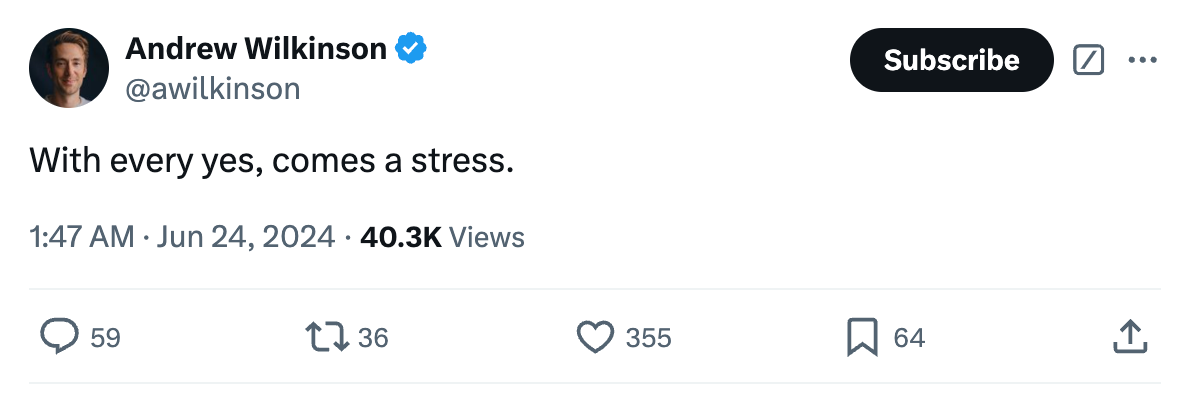Founder's focus
Will you trust me if I say no is a superpower? Let's explore it today with this post.
Every week, I get dozens of messages:
“Let us identify how we may benefit mutually.”
“Quick proposal for a collaboration”
“I would be happy to arrange a meeting with you.”
Three years ago, I would have agreed to all of the above without a second thought. But now the situation is completely different. Almost everything gets a ‘no’ now.
Not because those conversations do not make sense. But mostly because it is not easy for an entrepreneur to stay laser-focused, and that I believe is his/her single most significant superpower and protecting it means saying no a lot.
I deeply believe that starting a successful company starts and ends with two steps.
Do what is of the highest importance.
Focus on those things.
It sounds simple. If you only knew what a captain would feel riding a ship in turbulent waters.
When we started zazzy, I faced what I consider now a problem of paranoia perfectionism. You read about Steve Jobs and how obsessed he was with being perfect. Then, you listen to YCombinator go on about “the essence of being fast: ship fast, break things, and then scale really quickly”. Particularly for me, with a background in design, it’s easy enough to feel the pressure to seek perfection.
Here's what I learned: Choosing your battles based on your stage is important. Early-stage startups should focus on achieving product-market fit rather than perfecting design details.
This commitment bore fruit in the end. Within only three years, we grew to a team of more than 20 members, with over 80 clients on board and a retention rate of over 70%. This was not done by saying yes all the time, but rather the opposite: saying no to most things.
In these years, here are the three biggest focus-killers I've encountered:
Warm Intros
“Hey! You should meet this person..” These kinds of introductions are well-intentioned but hurt the business. They arise from a client, friend, or investor trying to help us or another party. Sometimes, you have no choice due to respect, relationship-building efforts, or other reasons. Your time and effort are your most precious commodity. If the meeting does not help your objectives, then a simple, courteous “no” would suffice.
Opportunity costs
We tend to be overly optimistic as founders. And, in a no-time “just a small partnership” becomes:
Ever-lasting coordinating calls.
Commitment nightmare, sticking to your words, and keeping your priorities aside.
Helping them with GTM, marketing, strategy and everything you know.
Introducing your team members, asking your team to share the bandwidth with them and everything in between.
Regular standup calls for progress updates.
It always begins as a quick collaboration. All of a sudden, what was believed to be a simple task turned into hell. Then, you ask yourself why you agreed to it.
Shiny star syndrome
I call this the shiny star syndrome because it gives us the illusion of a bright star in the sky, showing a path to success. Everything starts to look appealing when there's some cash in the bank:
Community building
Launching a series on YouTube
Expansion to other countries
Personal branding
Starting a podcast
Organising events
All of the above
You may be able to do all of them. But the important question is, should you? Is this the best use of our limited resources right now?
The success or failure of your startup depends on where you choose to focus and for how long. Saying "yes" to something new means saying "no" to many other things. Conversely, every "no" you give is a "yes" to something really important in the future.
I have a rule, or I can say a simple framework now.
It is a no if it does not help serve the users/clients more efficiently or add value to the core business. Everything else can wait.
Remember, your job isn't to be the most liked person in the startup ecosystem. Your job is to build something valuable. Sometimes, that means putting down the beer and saying, "Sorry, but I've got important work to do."
What are you saying no to this week?




